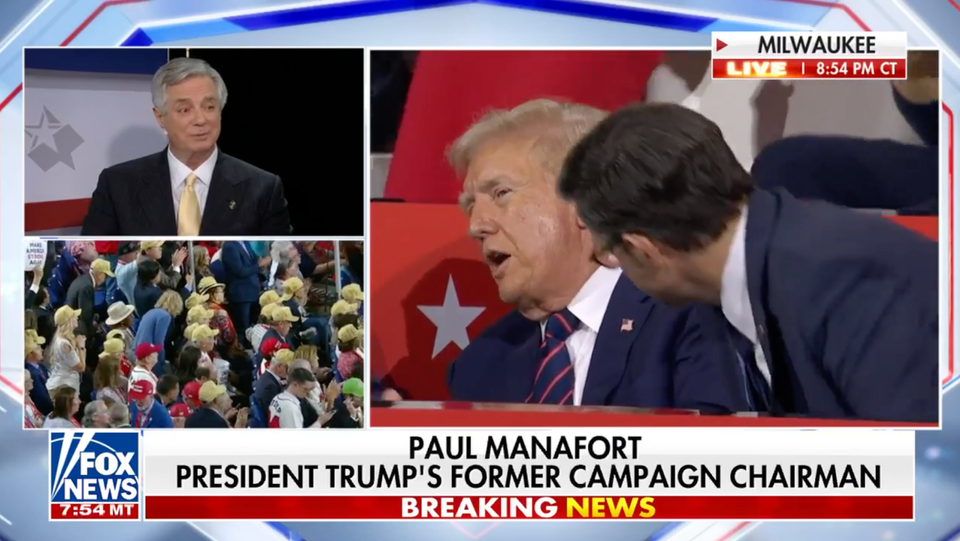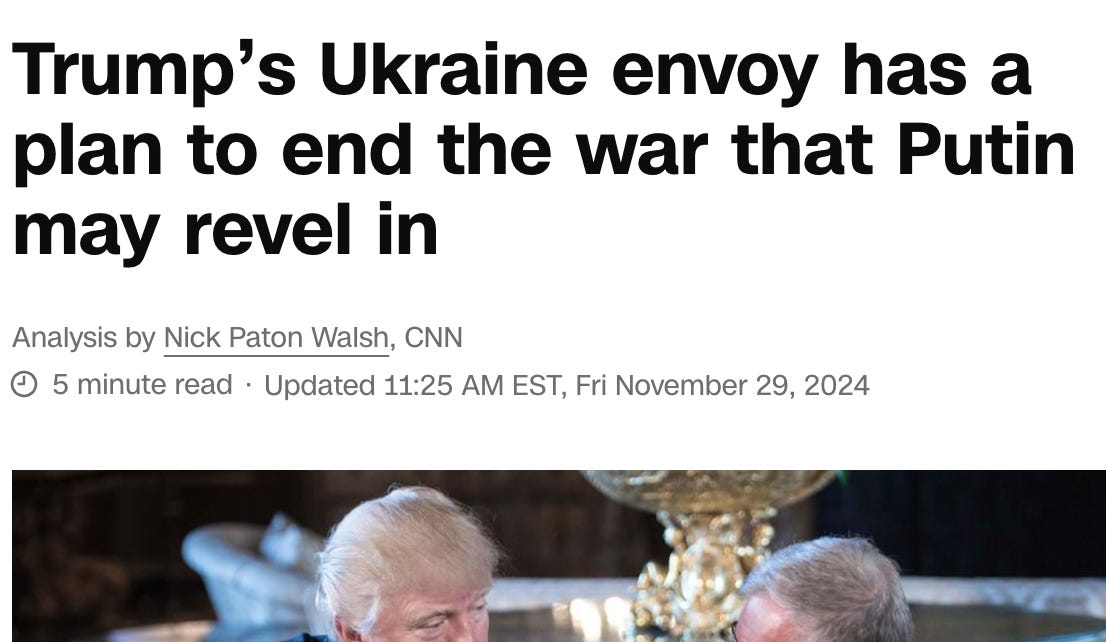Paul Manafort kicked the free world's ass

No one is better than this shark at enabling dictators. And the feast is about to begin.
We must now face the horror that the most influential political figure of our lifetime is the Republican strategist/lobbyist/Rasputin Paul Manafort. And not just for what he has done for Donald Trump, but for what he’s about to do for Vladimir Putin.
You probably know the name “Paul Manafort” and some significant details about him, like how he was the first guy fired by Trump for having ties to Putin, was imprisoned for money laundering along with other fraud and lies, and was pardoned by Trump in the lead-up to January 6th. But Manafort’s Wikipedia page is always worth revisiting as a fractal that reveals the story arc of the modern Republican Party:
Paul John Manafort Jr. (/ˈmænəfɔːrt/; born April 1, 1949) is an American former lobbyist, political consultant, attorney, and convicted felon. A long-time Republican Party campaign consultant, he chaired the Trump presidential campaign from June to August 2016. Manafort served as an adviser to the U.S. presidential campaigns of Republicans Gerald Ford, Ronald Reagan, George H. W. Bush, and Bob Dole. In 1980, he co-founded the Washington, D.C.–based lobbying firm Black, Manafort & Stone, along with principals Charles R. Black Jr. and Roger Stone,[1][2][3] joined by Peter G. Kelly in 1984.[4] Manafort often lobbied on behalf of foreign leaders such as former President of Ukraine Viktor Yanukovych, former dictator of the Philippines Ferdinand Marcos, former dictator of Zaire Mobutu Sese Seko, and Angolan guerrilla leader Jonas Savimbi.[5][6][7]
Despite this accumulation of astounding details, the facts on that page offer just a glimpse into Manafort’s role in shaping recent history. That role keeps growing, overwhelming the efforts of anyone who has attempted to bind him to the rule of law.
Giving Putin the goods
You may have missed this “analysis” that CNN published on Friday, November 29th:

First of all, any American plan to “end” the war in Ukraine is something that Putin would revel in. Because it’s not a war. It’s an invasion. For it to truly end, you only need one thing to stop, and that’s for Putin to stop the invasion and bring his forces back to Russia. That is obviously not what Trump’s Ukraine envoy is proposing.
He’s proposing that Putin be able to hold parts of Ukraine he’s successfully stolen in exchange for a promise, a promise that even Trump’s envoy notes is empty.
“Ukraine would not be asked to give up on reclaiming occupied territory, but it would agree to pursue it through diplomacy alone,” CNN’s Nick Paton Walsh wrote. “[The plan] accepts ‘this would require a future diplomatic breakthrough which probably will not occur before Putin leaves office.’”
The analysis ends with this bleak warning:
It is a bleak compromise for a bleak war. But it may not end it and instead open a new chapter where Western unity and support begins to crumble, and Putin edges, both at the negotiating table and at the front, closer towards his goals.
That sounds remarkably close to the assessment Paul Manafort gave a “peace plan” he was presented by Konstantin Kilimnik—“a liaison to Ukrainian and Russian politicians” wanted by the FBI—in 2016 and the years that followed. That means Manafort first heard the plan when he was Trump’s unpaid (by Trump) campaign manager. And he kept hearing about it after he left the Trump campaign in disgrace over his ties to Putin.
This plan was apparently, at first, part of a quid pro quo offer Kilimnik floated in exchange for Putin’s help in the election—an offer Manafort said he never took. However, Manafort did give Kilimnik internal Trump campaign polling data and strategy during the 2016 campaign, a fact that a judge ruled that he had lied to the Mueller investigation about.
Here’s how The New York Times described Kilimnik’s “peace plan” in one of the best pieces about Trump’s ties to Russia and their connection to the invasion of Ukraine:
Known loosely as the Mariupol plan, after the strategically vital port city, it called for the creation of an autonomous republic in Ukraine’s east, giving Putin effective control of the country’s industrial heartland, where Kremlin-armed, -funded and -directed “separatists” were waging a two-year-old shadow war that had left nearly 10,000 dead. The new republic’s leader would be none other than Yanukovych. The trade-off: “peace” for a broken and subservient Ukraine.
Though Manafort said he rejected this “crazy” plan to gain “backdoor” control of the former Soviet republic, he was still working on it with Kilimnik as late as 2018.
I know this is all very complex. It’s too complex. So complex that people don’t even know that Senate Republicans determined that Trump’s first campaign manager was a “grave counterintelligence threat.”
That’s a big part of how Paul Manafort has gotten away with… everything. No one has tried to put this whole story together—except Marcy Wheeler with Ball of Thread.
So, let me try to connect what I’ve learned as I’ve helped produce this podcast, which I’ve done mainly because I want to learn about my country’s history and understand how we’ve reached the brink of fascism over the last eight years.
Marcy has said several times during the series, “Paul Manafort never goes away.”
And what I’ve figured out—and this is me talking, of course, not Marcy—is that Paul Manafort is the individual most responsible for Donald Trump’s successful alliance with Putin, getting away with that alliance, and now essentially gifting Putin a way to cement his control of Eastern Ukraine while threatening the rest of the country for the rest of that dictator’s life.
The political mastermind of it all
As we put together episode 10 of Ball of Thread, I found a very recent interview with Manafort and Tucker Carlson that has been viewed nearly half a million times but probably not by anyone to the left of Donald Trump Jr.
The video was extremely useful for a specific purpose. Marcy wanted to highlight Manafort’s connection to Igor Furman, something I’d never heard mentioned before and never comes up in best known movie on the subject of how Lev Parnas and Igor Furman used their ties in Ukraine to try to help Rudy Giuliani frame the Bidens.
Manafort doesn’t admit that tie but he does acknowledge he knew about the business dealings of Hunter Biden and Hunter Biden’s firm in Ukraine and found them “untoward.” Was he the one who pointed Rudy and Trump in the direction of Ukraine to try to take out Joe Biden? Who knows? But let’s say, “Yes.”
That would make him key to a plot that helped destroy our current president’s image and reelect Donald Trump. And even if Manafort didn’t directly initiate that effort, we know he was intimately involved in the smearing of Biden using conspiracy theories about Ukraine gleaned from Russian sources.
That’s not the only critical revelation about Manafort that the public is missing. In episode two, Marcy explains how he came up with the plot to discredit the entire investigation into Trump’s ties to Russia by focusing on the Steele Dossier, a strategy that effectively worked. It’s a strategy that helped give us another Trump stab at authoritarianism and soon it will likely give Putin much of Ukraine.
A shark-eyed view of the world
Watching Manafort talk to Tucker in October, the confidence and coolness is astounding. And his assessment of the upcoming election is steely-eyed and, unfortunately, spot on:
TUCKER: Who's going to win this race?
MANAFORT: Donald Trump.
TUCKER: You sound pretty authoritative on that.
MANAFORT: I think it's his to lose at this point in time. Yes.
Well, you look at the composition of the undecided voter. And in the seven battleground states, the undecided voter overwhelmingly thinks the country has been going in the wrong direction. They feel like they have nothing benefited in the last four years. They remember because Trump was president just four years ago, what it was like when he was president pre Covid. And so they can compare his record versus Biden/Harris record. And you look at the undecided issue agenda. It's the Trump issue agenda. The number one issue is the economy, inflation. Number two is the border and illegal immigration and crime. Third issue is safety in the world. And somewhere there's abortion. Somewhere is fear for democracy. But when you look at how the voters feel on the issue of democracy, it splits 50/50. I mean, if the country is fearful because of what Biden has been doing and the other half is fearful because of what Biden says Trump will do, except Trump has been president. So you can't say Trump will do something beyond what he did as president before. So the issue doesn't cut with the remaining underside. It's what cuts is the economy, the border, the wars in Ukraine and in the gulf. And there he has a ten to twelve point lead on those major issues over Harris among the undecideds.
So it's kind of that simple. I mean, so their issues, Harris's issues are Trump's personality, abortion in January 6. Trump's issues are the economy, the border, crime and the threat of nuclear war. It seems like he's got a much stronger hand than she does. Yeah. I mean, if she had run a different campaign, it might have been more difficult for Trump, but she basically gave Trump his issues to be the deciding issues in the campaign.
Watching this in mid-November, I had the feeling that I was watching the man who helped Trump win in 2016… and 2024. I was also struck with the feeling that one of the big reasons Trump may not have won in 2020 is because he didn’t have Manafort at his side.
What Manafort understands about politics, what he helps encourage in Trump, is the shark’s urge to keep moving, to never accept defeat, and to always hunt for blood because another feeding is bound to arrive.
The sharks won, for now. And both Putin and Trump appear ready to feast on Ukraine.
Member discussion